Challenges and Strategies for IKEA's Global Expansion Report
VerifiedAdded on 2021/02/20
|8
|1997
|1443
Report
AI Summary
This report examines the challenges IKEA faces in its global expansion, focusing on issues such as language and cultural barriers, local competition, compliance and tax laws, supply chain risks, currency fluctuations, and political instability. The report analyzes the complexities of international trade laws, the economics of globalization, and environmental impacts. It also explores diversification strategies and supply chain management challenges. The report provides recommendations for IKEA to overcome these challenges, including finding the right partners, hiring language experts, seeking legal counsel, managing currency risks, adapting to market trends, and developing strategic international expansion plans. The report concludes that while IKEA faces significant obstacles in foreign markets, strategic planning and adaptation can help the company succeed in its global endeavors.
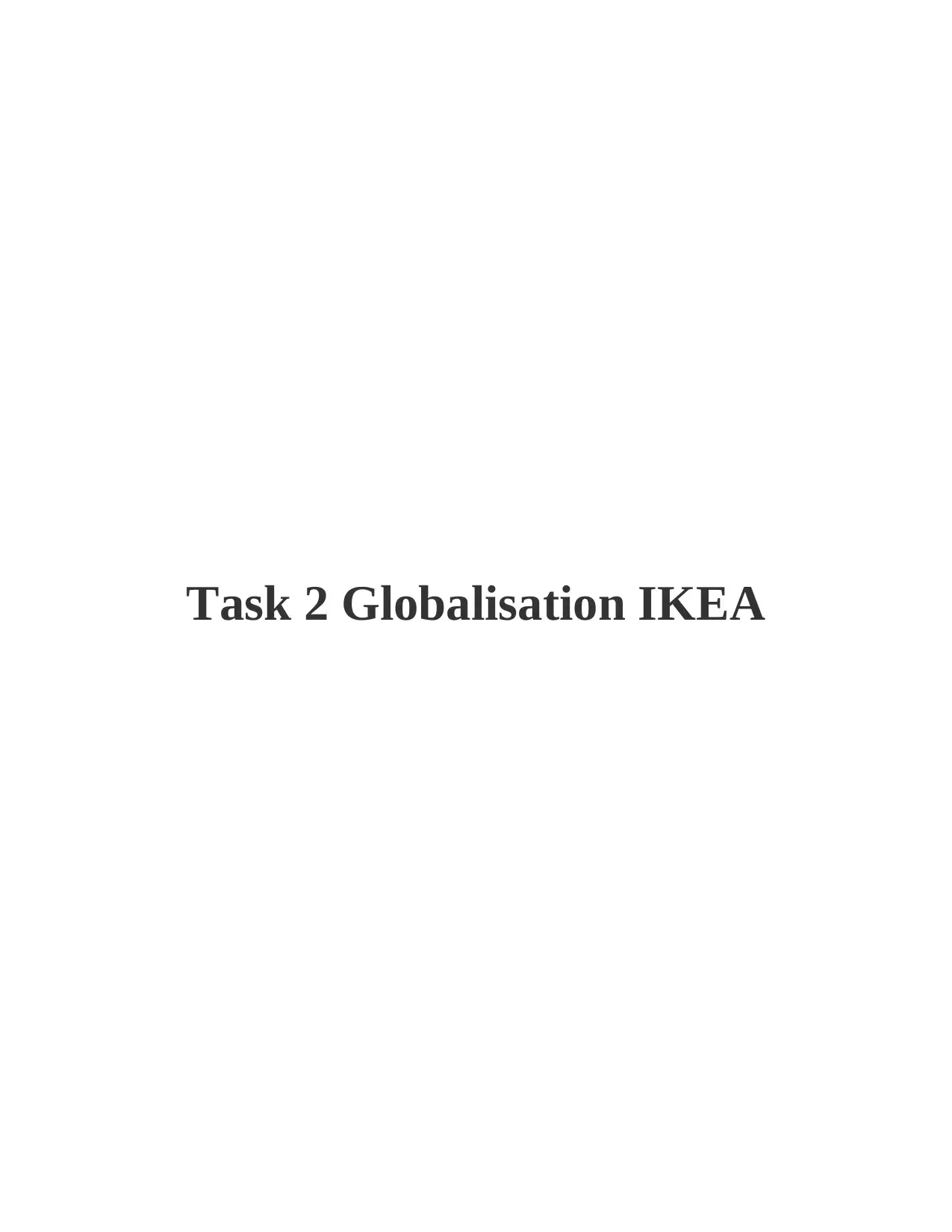
Task 2 Globalisation IKEA
Paraphrase This Document
Need a fresh take? Get an instant paraphrase of this document with our AI Paraphraser
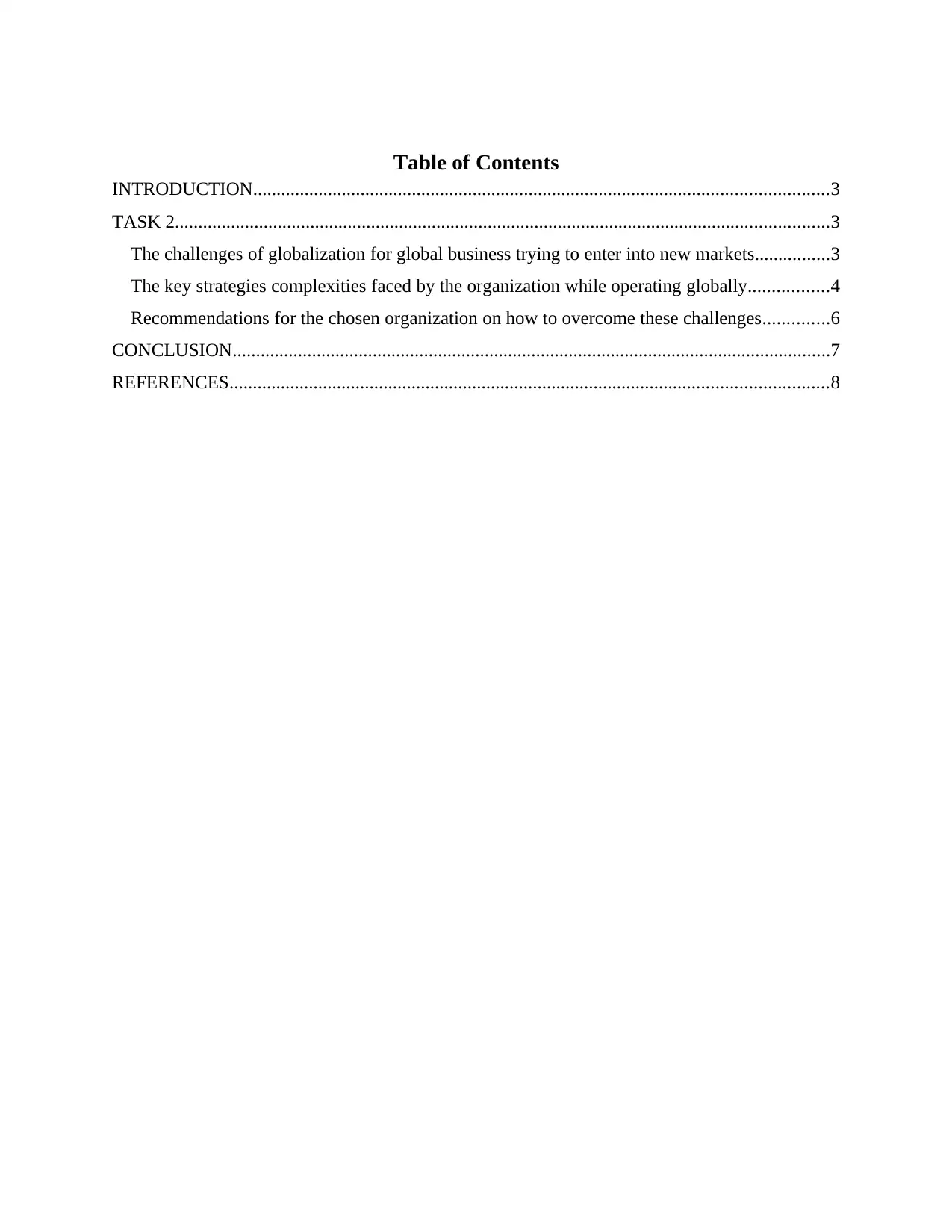
Table of Contents
INTRODUCTION...........................................................................................................................3
TASK 2............................................................................................................................................3
The challenges of globalization for global business trying to enter into new markets................3
The key strategies complexities faced by the organization while operating globally.................4
Recommendations for the chosen organization on how to overcome these challenges..............6
CONCLUSION................................................................................................................................7
REFERENCES................................................................................................................................8
INTRODUCTION...........................................................................................................................3
TASK 2............................................................................................................................................3
The challenges of globalization for global business trying to enter into new markets................3
The key strategies complexities faced by the organization while operating globally.................4
Recommendations for the chosen organization on how to overcome these challenges..............6
CONCLUSION................................................................................................................................7
REFERENCES................................................................................................................................8
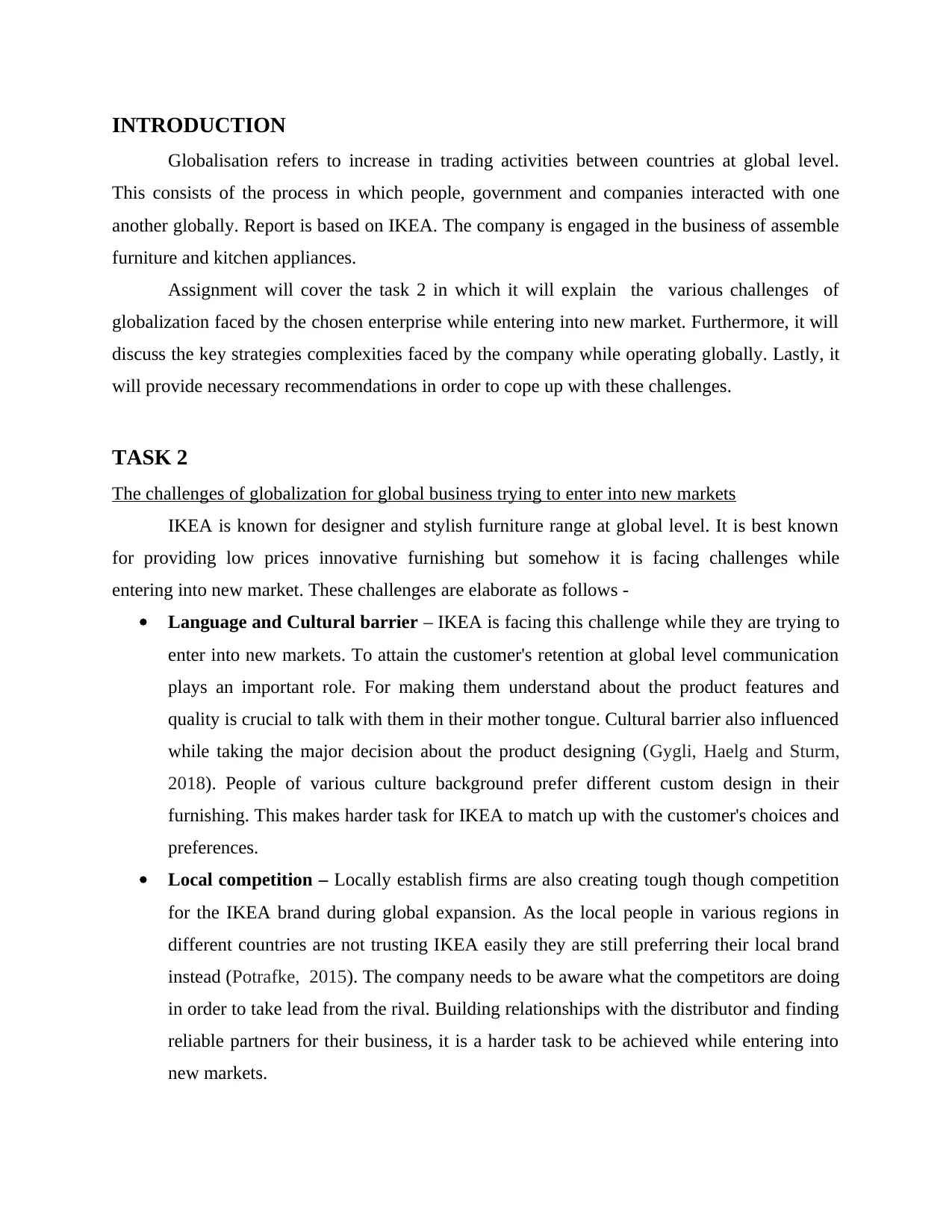
INTRODUCTION
Globalisation refers to increase in trading activities between countries at global level.
This consists of the process in which people, government and companies interacted with one
another globally. Report is based on IKEA. The company is engaged in the business of assemble
furniture and kitchen appliances.
Assignment will cover the task 2 in which it will explain the various challenges of
globalization faced by the chosen enterprise while entering into new market. Furthermore, it will
discuss the key strategies complexities faced by the company while operating globally. Lastly, it
will provide necessary recommendations in order to cope up with these challenges.
TASK 2
The challenges of globalization for global business trying to enter into new markets
IKEA is known for designer and stylish furniture range at global level. It is best known
for providing low prices innovative furnishing but somehow it is facing challenges while
entering into new market. These challenges are elaborate as follows -
Language and Cultural barrier – IKEA is facing this challenge while they are trying to
enter into new markets. To attain the customer's retention at global level communication
plays an important role. For making them understand about the product features and
quality is crucial to talk with them in their mother tongue. Cultural barrier also influenced
while taking the major decision about the product designing (Gygli, Haelg and Sturm,
2018). People of various culture background prefer different custom design in their
furnishing. This makes harder task for IKEA to match up with the customer's choices and
preferences.
Local competition – Locally establish firms are also creating tough though competition
for the IKEA brand during global expansion. As the local people in various regions in
different countries are not trusting IKEA easily they are still preferring their local brand
instead (Potrafke, 2015). The company needs to be aware what the competitors are doing
in order to take lead from the rival. Building relationships with the distributor and finding
reliable partners for their business, it is a harder task to be achieved while entering into
new markets.
Globalisation refers to increase in trading activities between countries at global level.
This consists of the process in which people, government and companies interacted with one
another globally. Report is based on IKEA. The company is engaged in the business of assemble
furniture and kitchen appliances.
Assignment will cover the task 2 in which it will explain the various challenges of
globalization faced by the chosen enterprise while entering into new market. Furthermore, it will
discuss the key strategies complexities faced by the company while operating globally. Lastly, it
will provide necessary recommendations in order to cope up with these challenges.
TASK 2
The challenges of globalization for global business trying to enter into new markets
IKEA is known for designer and stylish furniture range at global level. It is best known
for providing low prices innovative furnishing but somehow it is facing challenges while
entering into new market. These challenges are elaborate as follows -
Language and Cultural barrier – IKEA is facing this challenge while they are trying to
enter into new markets. To attain the customer's retention at global level communication
plays an important role. For making them understand about the product features and
quality is crucial to talk with them in their mother tongue. Cultural barrier also influenced
while taking the major decision about the product designing (Gygli, Haelg and Sturm,
2018). People of various culture background prefer different custom design in their
furnishing. This makes harder task for IKEA to match up with the customer's choices and
preferences.
Local competition – Locally establish firms are also creating tough though competition
for the IKEA brand during global expansion. As the local people in various regions in
different countries are not trusting IKEA easily they are still preferring their local brand
instead (Potrafke, 2015). The company needs to be aware what the competitors are doing
in order to take lead from the rival. Building relationships with the distributor and finding
reliable partners for their business, it is a harder task to be achieved while entering into
new markets.
⊘ This is a preview!⊘
Do you want full access?
Subscribe today to unlock all pages.

Trusted by 1+ million students worldwide
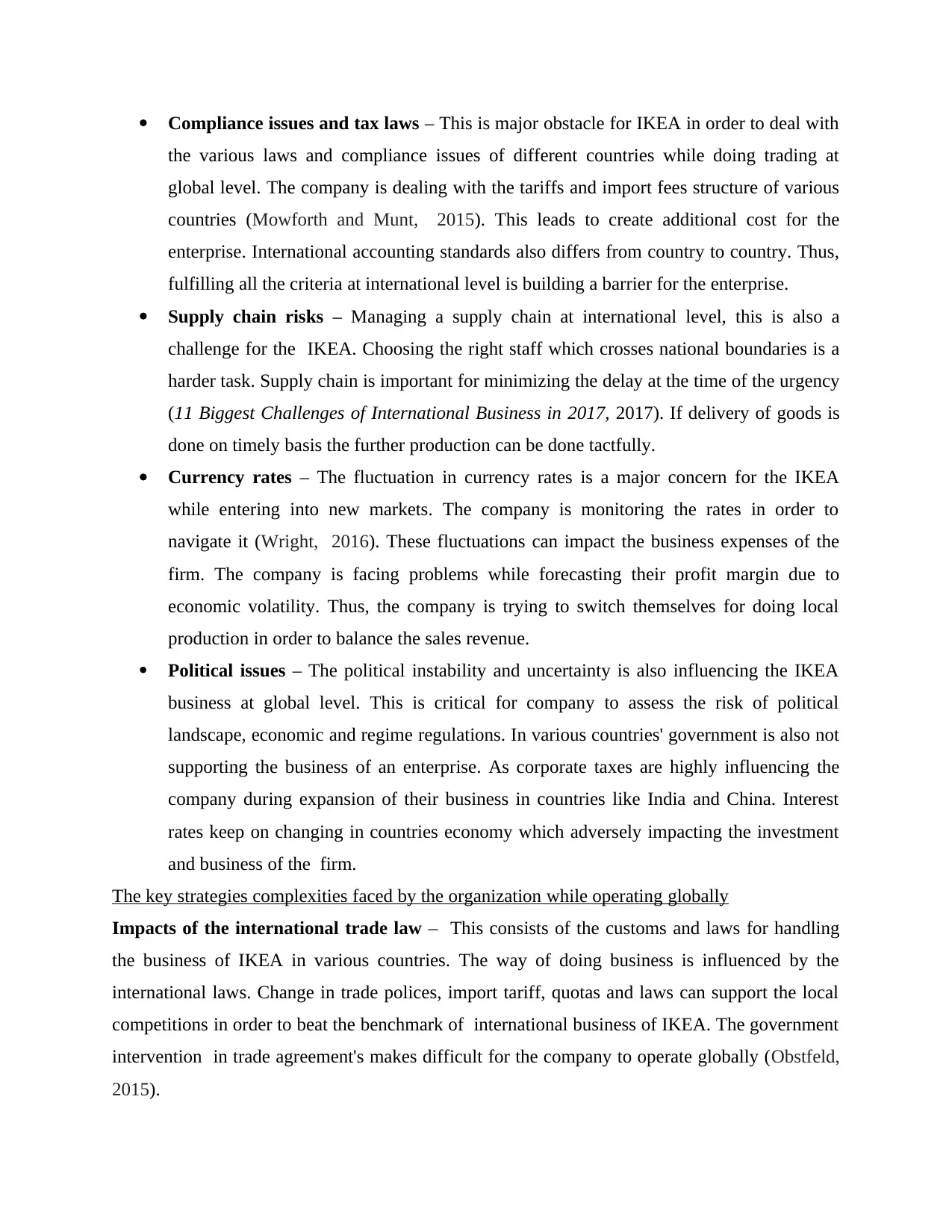
Compliance issues and tax laws – This is major obstacle for IKEA in order to deal with
the various laws and compliance issues of different countries while doing trading at
global level. The company is dealing with the tariffs and import fees structure of various
countries (Mowforth and Munt, 2015). This leads to create additional cost for the
enterprise. International accounting standards also differs from country to country. Thus,
fulfilling all the criteria at international level is building a barrier for the enterprise.
Supply chain risks – Managing a supply chain at international level, this is also a
challenge for the IKEA. Choosing the right staff which crosses national boundaries is a
harder task. Supply chain is important for minimizing the delay at the time of the urgency
(11 Biggest Challenges of International Business in 2017, 2017). If delivery of goods is
done on timely basis the further production can be done tactfully.
Currency rates – The fluctuation in currency rates is a major concern for the IKEA
while entering into new markets. The company is monitoring the rates in order to
navigate it (Wright, 2016). These fluctuations can impact the business expenses of the
firm. The company is facing problems while forecasting their profit margin due to
economic volatility. Thus, the company is trying to switch themselves for doing local
production in order to balance the sales revenue.
Political issues – The political instability and uncertainty is also influencing the IKEA
business at global level. This is critical for company to assess the risk of political
landscape, economic and regime regulations. In various countries' government is also not
supporting the business of an enterprise. As corporate taxes are highly influencing the
company during expansion of their business in countries like India and China. Interest
rates keep on changing in countries economy which adversely impacting the investment
and business of the firm.
The key strategies complexities faced by the organization while operating globally
Impacts of the international trade law – This consists of the customs and laws for handling
the business of IKEA in various countries. The way of doing business is influenced by the
international laws. Change in trade polices, import tariff, quotas and laws can support the local
competitions in order to beat the benchmark of international business of IKEA. The government
intervention in trade agreement's makes difficult for the company to operate globally (Obstfeld,
2015).
the various laws and compliance issues of different countries while doing trading at
global level. The company is dealing with the tariffs and import fees structure of various
countries (Mowforth and Munt, 2015). This leads to create additional cost for the
enterprise. International accounting standards also differs from country to country. Thus,
fulfilling all the criteria at international level is building a barrier for the enterprise.
Supply chain risks – Managing a supply chain at international level, this is also a
challenge for the IKEA. Choosing the right staff which crosses national boundaries is a
harder task. Supply chain is important for minimizing the delay at the time of the urgency
(11 Biggest Challenges of International Business in 2017, 2017). If delivery of goods is
done on timely basis the further production can be done tactfully.
Currency rates – The fluctuation in currency rates is a major concern for the IKEA
while entering into new markets. The company is monitoring the rates in order to
navigate it (Wright, 2016). These fluctuations can impact the business expenses of the
firm. The company is facing problems while forecasting their profit margin due to
economic volatility. Thus, the company is trying to switch themselves for doing local
production in order to balance the sales revenue.
Political issues – The political instability and uncertainty is also influencing the IKEA
business at global level. This is critical for company to assess the risk of political
landscape, economic and regime regulations. In various countries' government is also not
supporting the business of an enterprise. As corporate taxes are highly influencing the
company during expansion of their business in countries like India and China. Interest
rates keep on changing in countries economy which adversely impacting the investment
and business of the firm.
The key strategies complexities faced by the organization while operating globally
Impacts of the international trade law – This consists of the customs and laws for handling
the business of IKEA in various countries. The way of doing business is influenced by the
international laws. Change in trade polices, import tariff, quotas and laws can support the local
competitions in order to beat the benchmark of international business of IKEA. The government
intervention in trade agreement's makes difficult for the company to operate globally (Obstfeld,
2015).
Paraphrase This Document
Need a fresh take? Get an instant paraphrase of this document with our AI Paraphraser
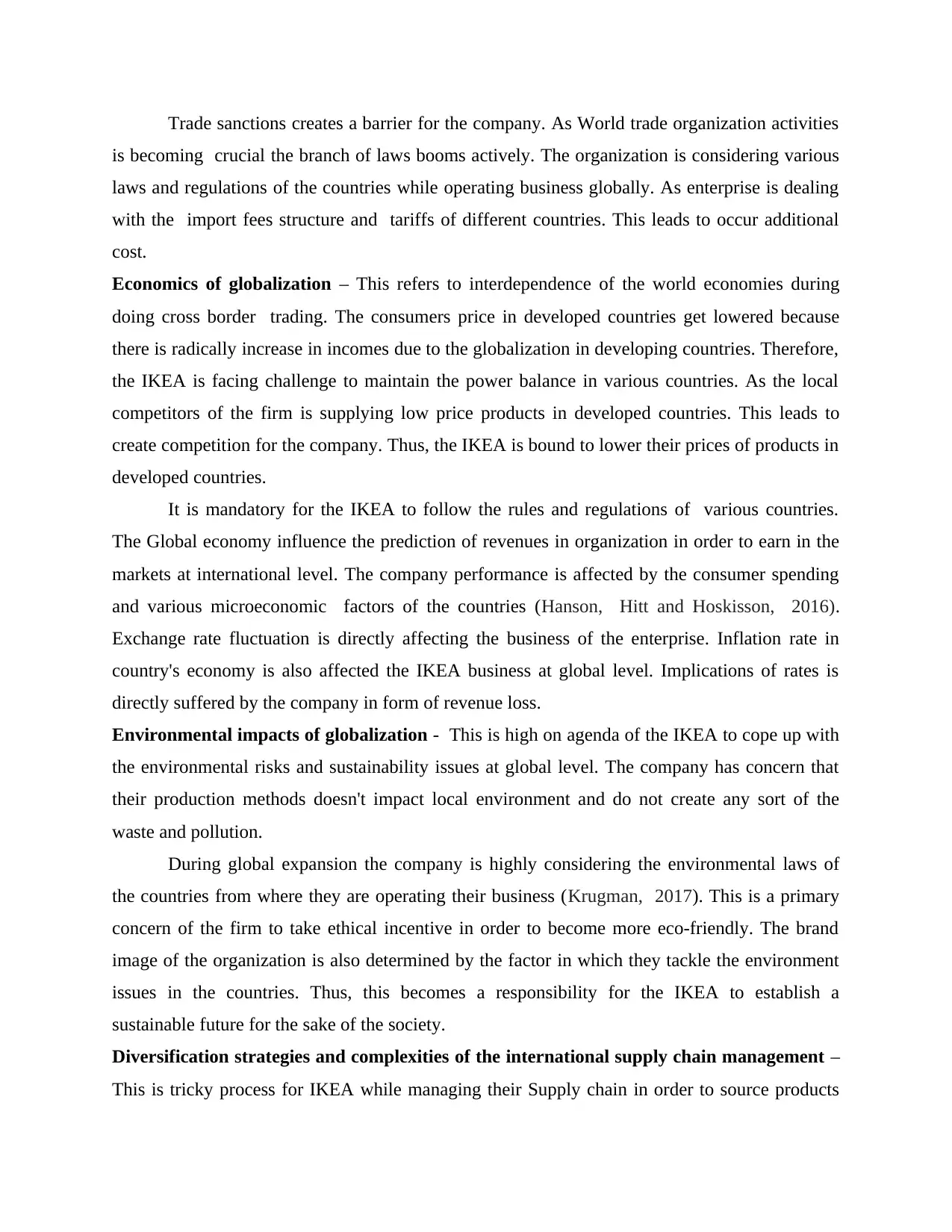
Trade sanctions creates a barrier for the company. As World trade organization activities
is becoming crucial the branch of laws booms actively. The organization is considering various
laws and regulations of the countries while operating business globally. As enterprise is dealing
with the import fees structure and tariffs of different countries. This leads to occur additional
cost.
Economics of globalization – This refers to interdependence of the world economies during
doing cross border trading. The consumers price in developed countries get lowered because
there is radically increase in incomes due to the globalization in developing countries. Therefore,
the IKEA is facing challenge to maintain the power balance in various countries. As the local
competitors of the firm is supplying low price products in developed countries. This leads to
create competition for the company. Thus, the IKEA is bound to lower their prices of products in
developed countries.
It is mandatory for the IKEA to follow the rules and regulations of various countries.
The Global economy influence the prediction of revenues in organization in order to earn in the
markets at international level. The company performance is affected by the consumer spending
and various microeconomic factors of the countries (Hanson, Hitt and Hoskisson, 2016).
Exchange rate fluctuation is directly affecting the business of the enterprise. Inflation rate in
country's economy is also affected the IKEA business at global level. Implications of rates is
directly suffered by the company in form of revenue loss.
Environmental impacts of globalization - This is high on agenda of the IKEA to cope up with
the environmental risks and sustainability issues at global level. The company has concern that
their production methods doesn't impact local environment and do not create any sort of the
waste and pollution.
During global expansion the company is highly considering the environmental laws of
the countries from where they are operating their business (Krugman, 2017). This is a primary
concern of the firm to take ethical incentive in order to become more eco-friendly. The brand
image of the organization is also determined by the factor in which they tackle the environment
issues in the countries. Thus, this becomes a responsibility for the IKEA to establish a
sustainable future for the sake of the society.
Diversification strategies and complexities of the international supply chain management –
This is tricky process for IKEA while managing their Supply chain in order to source products
is becoming crucial the branch of laws booms actively. The organization is considering various
laws and regulations of the countries while operating business globally. As enterprise is dealing
with the import fees structure and tariffs of different countries. This leads to occur additional
cost.
Economics of globalization – This refers to interdependence of the world economies during
doing cross border trading. The consumers price in developed countries get lowered because
there is radically increase in incomes due to the globalization in developing countries. Therefore,
the IKEA is facing challenge to maintain the power balance in various countries. As the local
competitors of the firm is supplying low price products in developed countries. This leads to
create competition for the company. Thus, the IKEA is bound to lower their prices of products in
developed countries.
It is mandatory for the IKEA to follow the rules and regulations of various countries.
The Global economy influence the prediction of revenues in organization in order to earn in the
markets at international level. The company performance is affected by the consumer spending
and various microeconomic factors of the countries (Hanson, Hitt and Hoskisson, 2016).
Exchange rate fluctuation is directly affecting the business of the enterprise. Inflation rate in
country's economy is also affected the IKEA business at global level. Implications of rates is
directly suffered by the company in form of revenue loss.
Environmental impacts of globalization - This is high on agenda of the IKEA to cope up with
the environmental risks and sustainability issues at global level. The company has concern that
their production methods doesn't impact local environment and do not create any sort of the
waste and pollution.
During global expansion the company is highly considering the environmental laws of
the countries from where they are operating their business (Krugman, 2017). This is a primary
concern of the firm to take ethical incentive in order to become more eco-friendly. The brand
image of the organization is also determined by the factor in which they tackle the environment
issues in the countries. Thus, this becomes a responsibility for the IKEA to establish a
sustainable future for the sake of the society.
Diversification strategies and complexities of the international supply chain management –
This is tricky process for IKEA while managing their Supply chain in order to source products
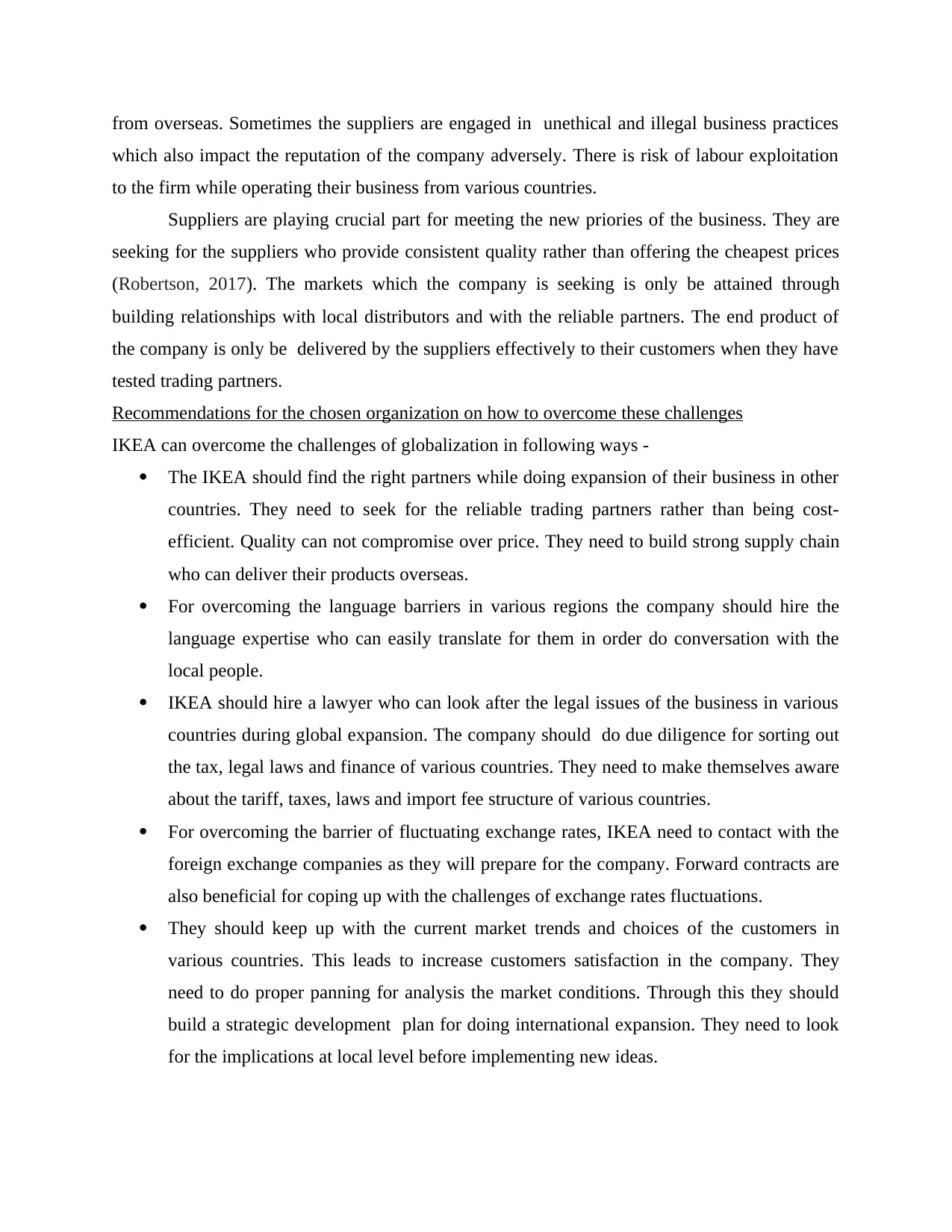
from overseas. Sometimes the suppliers are engaged in unethical and illegal business practices
which also impact the reputation of the company adversely. There is risk of labour exploitation
to the firm while operating their business from various countries.
Suppliers are playing crucial part for meeting the new priories of the business. They are
seeking for the suppliers who provide consistent quality rather than offering the cheapest prices
(Robertson, 2017). The markets which the company is seeking is only be attained through
building relationships with local distributors and with the reliable partners. The end product of
the company is only be delivered by the suppliers effectively to their customers when they have
tested trading partners.
Recommendations for the chosen organization on how to overcome these challenges
IKEA can overcome the challenges of globalization in following ways -
The IKEA should find the right partners while doing expansion of their business in other
countries. They need to seek for the reliable trading partners rather than being cost-
efficient. Quality can not compromise over price. They need to build strong supply chain
who can deliver their products overseas.
For overcoming the language barriers in various regions the company should hire the
language expertise who can easily translate for them in order do conversation with the
local people.
IKEA should hire a lawyer who can look after the legal issues of the business in various
countries during global expansion. The company should do due diligence for sorting out
the tax, legal laws and finance of various countries. They need to make themselves aware
about the tariff, taxes, laws and import fee structure of various countries.
For overcoming the barrier of fluctuating exchange rates, IKEA need to contact with the
foreign exchange companies as they will prepare for the company. Forward contracts are
also beneficial for coping up with the challenges of exchange rates fluctuations.
They should keep up with the current market trends and choices of the customers in
various countries. This leads to increase customers satisfaction in the company. They
need to do proper panning for analysis the market conditions. Through this they should
build a strategic development plan for doing international expansion. They need to look
for the implications at local level before implementing new ideas.
which also impact the reputation of the company adversely. There is risk of labour exploitation
to the firm while operating their business from various countries.
Suppliers are playing crucial part for meeting the new priories of the business. They are
seeking for the suppliers who provide consistent quality rather than offering the cheapest prices
(Robertson, 2017). The markets which the company is seeking is only be attained through
building relationships with local distributors and with the reliable partners. The end product of
the company is only be delivered by the suppliers effectively to their customers when they have
tested trading partners.
Recommendations for the chosen organization on how to overcome these challenges
IKEA can overcome the challenges of globalization in following ways -
The IKEA should find the right partners while doing expansion of their business in other
countries. They need to seek for the reliable trading partners rather than being cost-
efficient. Quality can not compromise over price. They need to build strong supply chain
who can deliver their products overseas.
For overcoming the language barriers in various regions the company should hire the
language expertise who can easily translate for them in order do conversation with the
local people.
IKEA should hire a lawyer who can look after the legal issues of the business in various
countries during global expansion. The company should do due diligence for sorting out
the tax, legal laws and finance of various countries. They need to make themselves aware
about the tariff, taxes, laws and import fee structure of various countries.
For overcoming the barrier of fluctuating exchange rates, IKEA need to contact with the
foreign exchange companies as they will prepare for the company. Forward contracts are
also beneficial for coping up with the challenges of exchange rates fluctuations.
They should keep up with the current market trends and choices of the customers in
various countries. This leads to increase customers satisfaction in the company. They
need to do proper panning for analysis the market conditions. Through this they should
build a strategic development plan for doing international expansion. They need to look
for the implications at local level before implementing new ideas.
⊘ This is a preview!⊘
Do you want full access?
Subscribe today to unlock all pages.

Trusted by 1+ million students worldwide
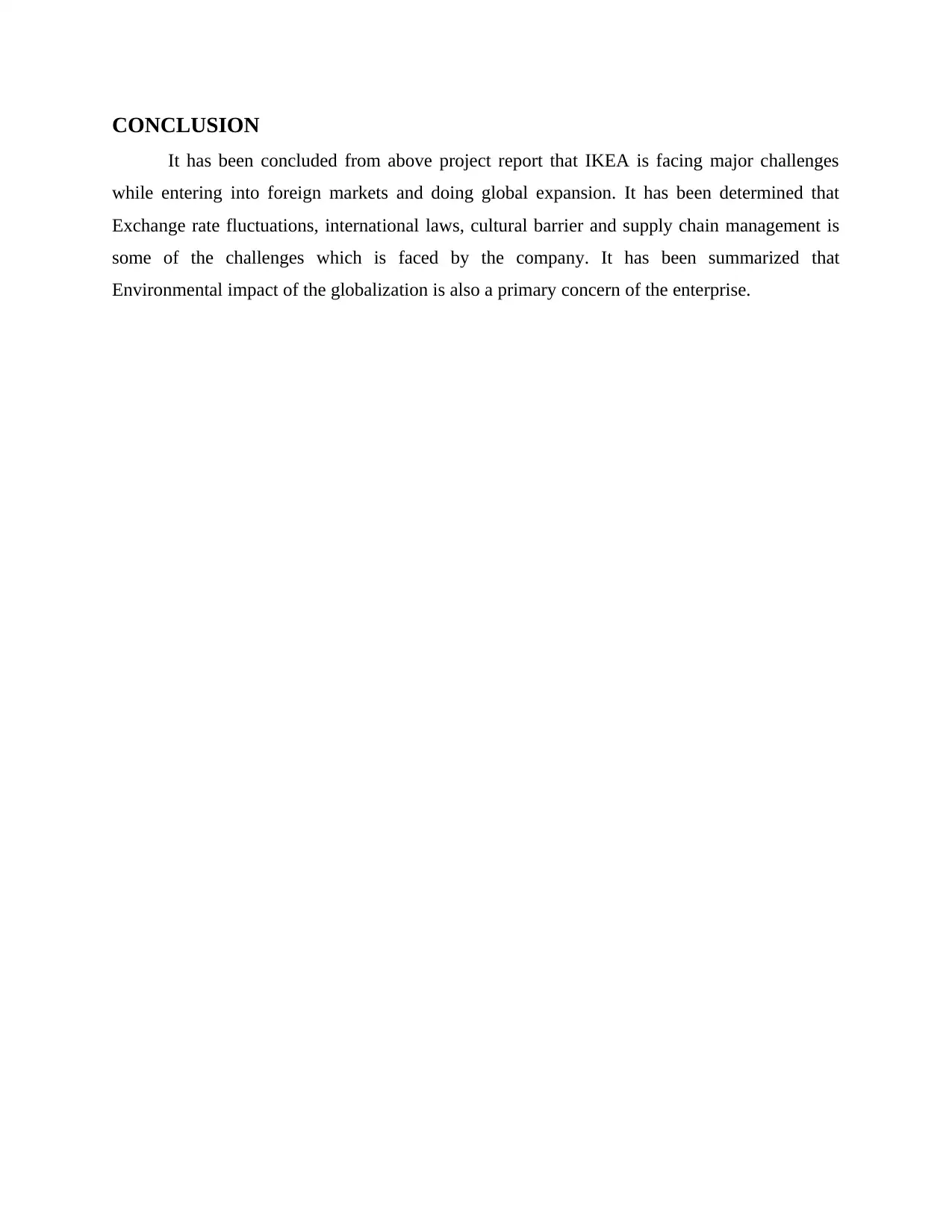
CONCLUSION
It has been concluded from above project report that IKEA is facing major challenges
while entering into foreign markets and doing global expansion. It has been determined that
Exchange rate fluctuations, international laws, cultural barrier and supply chain management is
some of the challenges which is faced by the company. It has been summarized that
Environmental impact of the globalization is also a primary concern of the enterprise.
It has been concluded from above project report that IKEA is facing major challenges
while entering into foreign markets and doing global expansion. It has been determined that
Exchange rate fluctuations, international laws, cultural barrier and supply chain management is
some of the challenges which is faced by the company. It has been summarized that
Environmental impact of the globalization is also a primary concern of the enterprise.
Paraphrase This Document
Need a fresh take? Get an instant paraphrase of this document with our AI Paraphraser
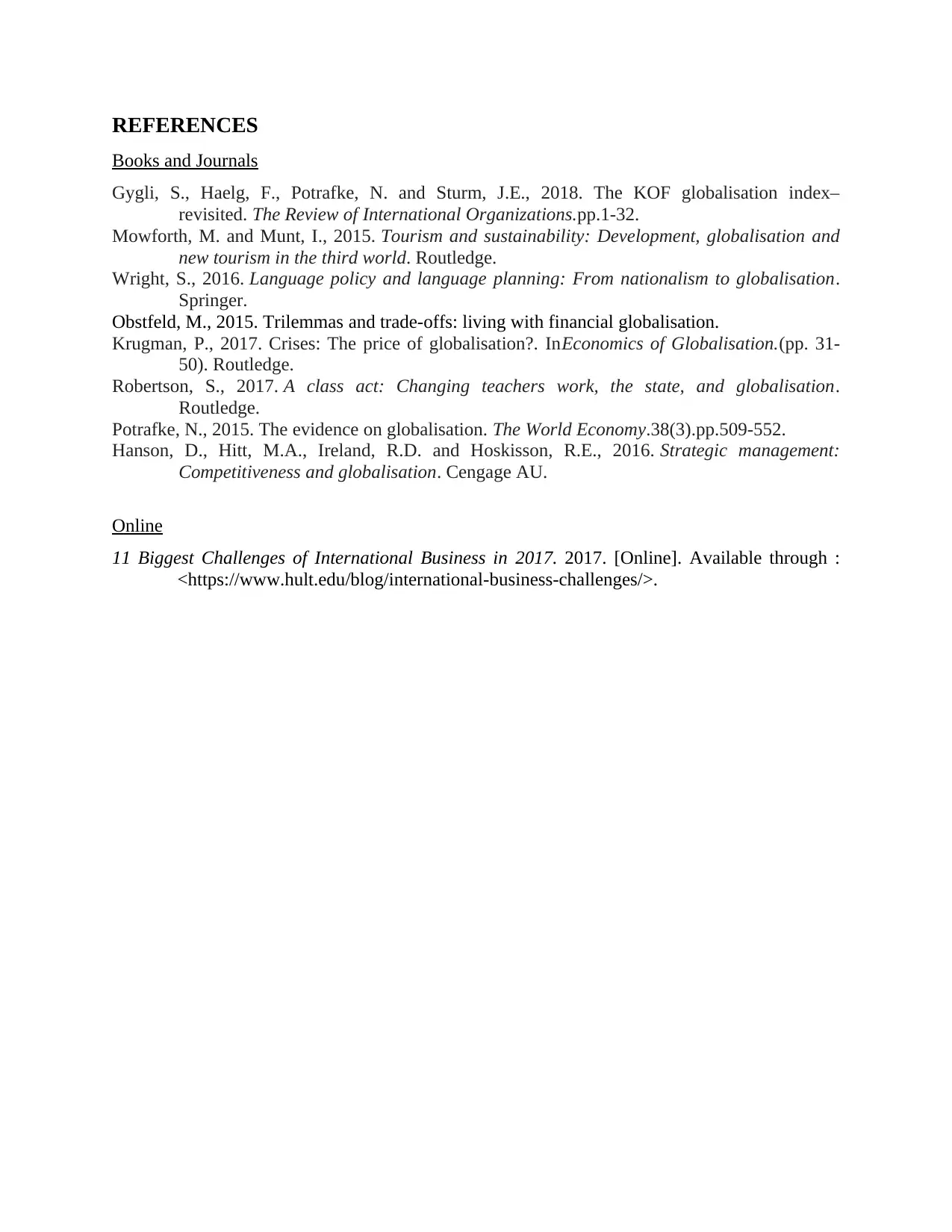
REFERENCES
Books and Journals
Gygli, S., Haelg, F., Potrafke, N. and Sturm, J.E., 2018. The KOF globalisation index–
revisited. The Review of International Organizations.pp.1-32.
Mowforth, M. and Munt, I., 2015. Tourism and sustainability: Development, globalisation and
new tourism in the third world. Routledge.
Wright, S., 2016. Language policy and language planning: From nationalism to globalisation.
Springer.
Obstfeld, M., 2015. Trilemmas and trade-offs: living with financial globalisation.
Krugman, P., 2017. Crises: The price of globalisation?. InEconomics of Globalisation.(pp. 31-
50). Routledge.
Robertson, S., 2017. A class act: Changing teachers work, the state, and globalisation.
Routledge.
Potrafke, N., 2015. The evidence on globalisation. The World Economy.38(3).pp.509-552.
Hanson, D., Hitt, M.A., Ireland, R.D. and Hoskisson, R.E., 2016. Strategic management:
Competitiveness and globalisation. Cengage AU.
Online
11 Biggest Challenges of International Business in 2017. 2017. [Online]. Available through :
<https://www.hult.edu/blog/international-business-challenges/>.
Books and Journals
Gygli, S., Haelg, F., Potrafke, N. and Sturm, J.E., 2018. The KOF globalisation index–
revisited. The Review of International Organizations.pp.1-32.
Mowforth, M. and Munt, I., 2015. Tourism and sustainability: Development, globalisation and
new tourism in the third world. Routledge.
Wright, S., 2016. Language policy and language planning: From nationalism to globalisation.
Springer.
Obstfeld, M., 2015. Trilemmas and trade-offs: living with financial globalisation.
Krugman, P., 2017. Crises: The price of globalisation?. InEconomics of Globalisation.(pp. 31-
50). Routledge.
Robertson, S., 2017. A class act: Changing teachers work, the state, and globalisation.
Routledge.
Potrafke, N., 2015. The evidence on globalisation. The World Economy.38(3).pp.509-552.
Hanson, D., Hitt, M.A., Ireland, R.D. and Hoskisson, R.E., 2016. Strategic management:
Competitiveness and globalisation. Cengage AU.
Online
11 Biggest Challenges of International Business in 2017. 2017. [Online]. Available through :
<https://www.hult.edu/blog/international-business-challenges/>.
1 out of 8
Related Documents
Your All-in-One AI-Powered Toolkit for Academic Success.
+13062052269
info@desklib.com
Available 24*7 on WhatsApp / Email
![[object Object]](/_next/static/media/star-bottom.7253800d.svg)
Unlock your academic potential
Copyright © 2020–2026 A2Z Services. All Rights Reserved. Developed and managed by ZUCOL.




